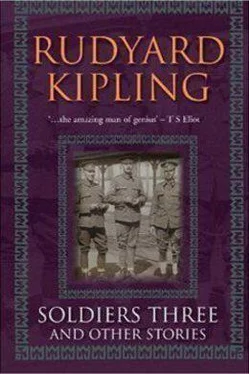Rudyard Kipling - Soldiers Three
Здесь есть возможность читать онлайн «Rudyard Kipling - Soldiers Three» весь текст электронной книги совершенно бесплатно (целиком полную версию без сокращений). В некоторых случаях можно слушать аудио, скачать через торрент в формате fb2 и присутствует краткое содержание. Год выпуска: 2014, Издательство: epubBooks Classics, Жанр: Классическая проза, на английском языке. Описание произведения, (предисловие) а так же отзывы посетителей доступны на портале библиотеки ЛибКат.
- Название:Soldiers Three
- Автор:
- Издательство:epubBooks Classics
- Жанр:
- Год:2014
- ISBN:нет данных
- Рейтинг книги:5 / 5. Голосов: 1
-
Избранное:Добавить в избранное
- Отзывы:
-
Ваша оценка:
- 100
- 1
- 2
- 3
- 4
- 5
Soldiers Three: краткое содержание, описание и аннотация
Предлагаем к чтению аннотацию, описание, краткое содержание или предисловие (зависит от того, что написал сам автор книги «Soldiers Three»). Если вы не нашли необходимую информацию о книге — напишите в комментариях, мы постараемся отыскать её.
Soldiers Three — читать онлайн бесплатно полную книгу (весь текст) целиком
Ниже представлен текст книги, разбитый по страницам. Система сохранения места последней прочитанной страницы, позволяет с удобством читать онлайн бесплатно книгу «Soldiers Three», без необходимости каждый раз заново искать на чём Вы остановились. Поставьте закладку, и сможете в любой момент перейти на страницу, на которой закончили чтение.
Интервал:
Закладка:
''Bin to a bloomin' sing–song, you two?' said the Artilleryman, who was taking his cartridge down to the Morning Gun. 'You're over merry for these dashed days.'
'I bid ye take care o' the brat, said he,
For it comes of a noble race,'
Learoyd bellowed. The voices died out in the swimming–bath.
'Oh, Terence!' I said, dropping into Mulvaney's speech, when we were alone, 'it's you that have the Tongue!'
He looked at me wearily; his eyes were sunk in his head, and his face was drawn and white. 'Eyah!' said he; 'I've blandandhered thim through the night somehow, but can thim that helps others help thimselves? Answer me that, Sorr!'
And over the bastions of Fort Amara broke the pitiless day.
In the Matter of a Private
Hurrah! hurrah! a soldier's life for me!
Shout, boys, shout! for it makes you jolly and free.
People who have seen, say that one of the quaintest spectacles of human frailty is an outbreak of hysterics in a girls' school. It starts without warning, generally on a hot afternoon, among the elder pupils. A girl giggles till the giggle gets beyond control. Then she throws up her head, and cries, ' Honk, honk, honk, ' like a wild goose, and tears mix with the laughter. If the mistress be wise, she will rap out something severe at this point to check matters. If she be tender–hearted, and send for a drink of water, the chances are largely in favour of another girl laughing at the afflicted one and herself collapsing. Thus the trouble spreads, and may end in half of what answers to the Lower Sixth of a boys' school rocking and whooping together. Given a week of warm weather, two stately promenades per diem, a heavy mutton and rice meal in the middle of the day, a certain amount of nagging from the teachers, and a few other things, some amazing effects develop. At least, this is what folk say who have had experience.
Now, the Mother Superior of a Convent and the Colonel of a British Infantry Regiment would be justly shocked at any comparison being made between their respective charges. But it is a fact that, under certain circumstances, Thomas in bulk can be worked up into ditthering, rippling hysteria. He does not weep, but he shows his trouble unmistakably, and the consequences get into the newspapers, and all the good people who hardly know a Martini from a Snider say: 'Take away the brute's ammunition!'
Thomas isn't a brute, and his business, which is to look after the virtuous people, demands that he shall have his ammunition to his hand. He doesn't wear silk stockings, and he really ought to be supplied with a new Adjective to help him to express his opinions: but, for all that, he is a great man. If you call him 'the heroic defender of the national honour' one day, and a 'brutal and licentious soldiery' the next, you naturally bewilder him, and he looks upon you with suspicion. There is nobody to speak for Thomas except people who have theories to work off on him; and nobody understands Thomas except Thomas, and he does not always know what is the matter with himself.
That is the prologue. This is the story:—
Corporal Slane was engaged to be married to Miss Jhansi M'Kenna, whose history is well known in the regiment and elsewhere. He had his Colonel's permission, and, being popular with the men, every arrangement had been made to give the wedding what Private Ortheris called 'eeklar.' It fell in the heart of the hot weather, and, after the wedding, Slane was going up to the Hills with the bride. None the less, Slane's grievance was that the affair would be only a hired–carriage wedding, and he felt that the 'eeklar' of that was meagre. Miss M'Kenna did not care so much. The Sergeant's wife was helping her to make her wedding–dress, and she was very busy. Slane was, just then, the only moderately contented man in barracks. All the rest were more or less miserable.
And they had so much to make them happy, too. All their work was over at eight in the morning, and for the rest of the day they could lie on their backs and smoke Canteen–plug and swear at the punkah–coolies. They enjoyed a fine, full flesh meal in the middle of the day, and then threw themselves down on their cots and sweated and slept till it was cool enough to go out with their 'towny,' whose vocabulary contained less than six hundred words, and the Adjective, and whose views on every conceivable question they had heard many times before.
There was the Canteen, of course, and there was the Temperance Room with the second–hand papers in it; but a man of any profession cannot read for eight hours a day in a temperature of 96 degrees or 98 degrees in the shade, running up sometimes to 103 degrees at midnight. Very few men, even though they get a pannikin of flat, stale, muddy beer and hide it under their cots, can continue drinking for six hours a day. One man tried, but he died, and nearly the whole regiment went to his funeral because it gave them something to do. It was too early for the excitement of fever or cholera. The men could only wait and wait and wait, and watch the shadow of the barrack creeping across the blinding white dust. That was a gay life.
They lounged about cantonments—it was too hot for any sort of game, and almost too hot for vice—and fuddled themselves in the evening, and filled themselves to distension with the healthy nitrogenous food provided for them, and the more they stoked the less exercise they took and more explosive they grew. Then tempers began to wear away, and men fell a–brooding over insults real or imaginary, for they had nothing else to think of. The tone of the repartees changed and instead of saying light–heartedly: 'I'll knock your silly face in.' men grew laboriously polite and hinted that the cantonments were not big enough for themselves and their enemy, and that there would be more space for one of the two in another Place.
It may have been the Devil who arranged the thing, but the fact of the case is that Losson had for a long time been worrying Simmons in an aimless way. It gave him occupation. The two had their cots side by side, and would sometimes spend a long afternoon swearing at each other; but Simmons was afraid of Losson and dared not challenge him to a fight. He thought over the words in the hot still nights, and half the hate he felt towards Losson he vented on the wretched punkah–coolie.
Losson bought a parrot in the bazar, and put it into a little cage, and lowered the cage into the cool darkness of a well, and sat on the well–curb, shouting bad language down to the parrot. He taught it to say: 'Simmons, ye so–oor ,' which means swine, and several other things entirely unfit for publication. He was a big gross man, and he shook like a jelly when the parrot had the sentence correctly. Simmons, however, shook with rage, for all the room were laughing at him—the parrot was such a disreputable puff of green feathers and it looked so human when it chattered. Losson used to sit, swinging his fat legs, on the side of the cot, and ask the parrot what it thought of Simmons. The parrot would answer: 'Simmons, ye so–oor .' 'Good boy,' Losson used to say, scratching the parrot's head; 'ye 'ear that, Sim?' And Simmons used to turn over on his stomach and make answer: 'I 'ear. Take 'eed you don't 'ear something one of these days.'
In the restless nights, after he had been asleep all day, fits of blind rage came upon Simmons and held him till he trembled all over, while he thought in how many different ways he would slay Losson. Sometimes he would picture himself trampling the life out of the man, with heavy ammunition–boots, and at others smashing in his face with the butt, and at others jumping on his shoulders and dragging the head back till the neckbone cracked. Then his mouth would feel hot and fevered, and he would reach out for another sup of the beer in the pannikin.
Читать дальшеИнтервал:
Закладка:
Похожие книги на «Soldiers Three»
Представляем Вашему вниманию похожие книги на «Soldiers Three» списком для выбора. Мы отобрали схожую по названию и смыслу литературу в надежде предоставить читателям больше вариантов отыскать новые, интересные, ещё непрочитанные произведения.
Обсуждение, отзывы о книге «Soldiers Three» и просто собственные мнения читателей. Оставьте ваши комментарии, напишите, что Вы думаете о произведении, его смысле или главных героях. Укажите что конкретно понравилось, а что нет, и почему Вы так считаете.












